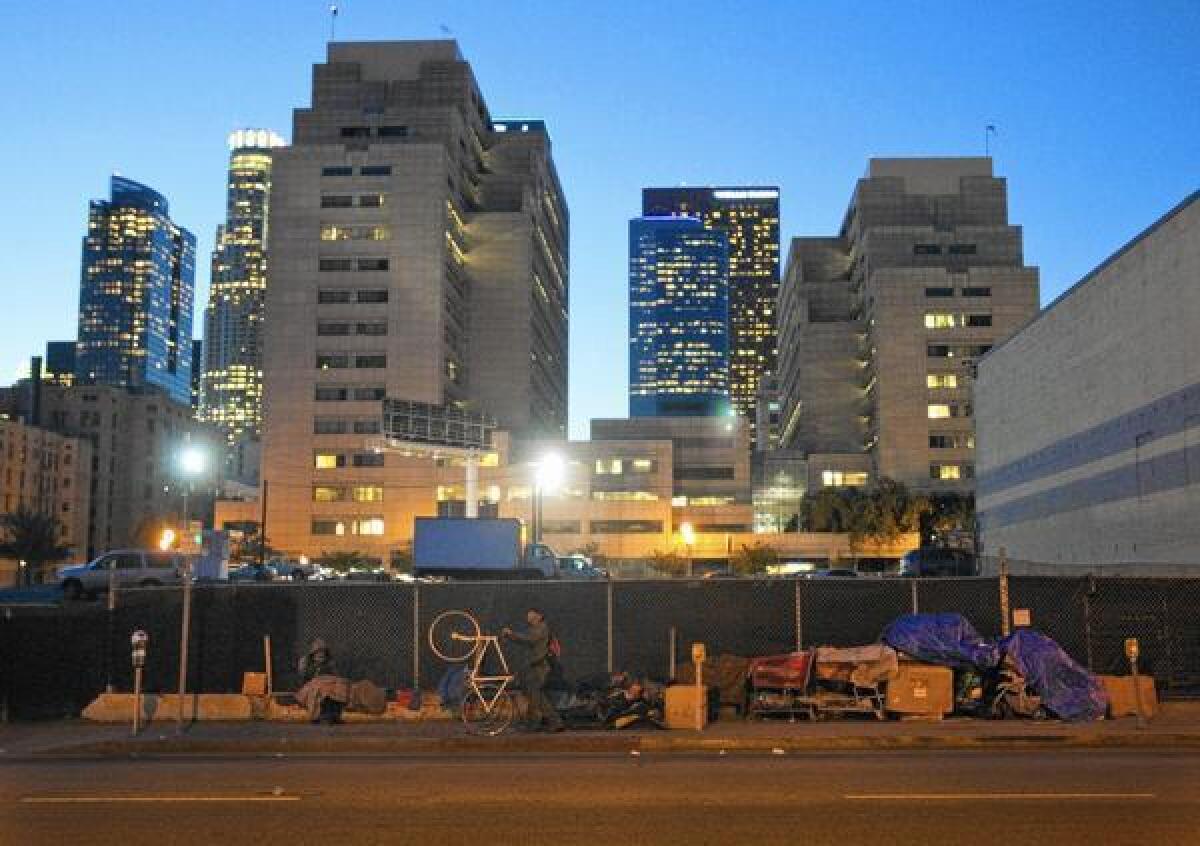Activists’ disruption of skid row tour was legal, court rules

- Share via
SAN FRANCISCO — Los Angeles police erred in 2011 when they arrested a homeless activist and threatened criminal sanctions against others for holding a noisy protest on skid row, a federal appeals court decided Tuesday.
A three-judge panel of the U.S. 9th Circuit Court of Appeals said the activists, who banged drums and shouted, were protected under a state law that applies to political gatherings. That law subjects protesters to arrest only if they hinder or prevent public meetings by “threats, intimidation or unlawful violence.”
“The ‘meeting’ at issue here involved the consideration of public questions, namely the conditions on skid row,” Judge Richard R. Clifton wrote for the panel.
For several years, city officials and business leaders led monthly walks into skid row to bring attention to the condition of the neighborhood. Activists protested that the walks were aimed at building support for ousting the area’s poor residents to hasten gentrification.
The ruling comes as the city’s relationship to skid row’s homeless people and their advocates grows increasingly frayed. The lofts and bistros of the downtown economic revival have squeezed the 50-block district’s 1,500 homeless people into tighter quarters and done little to improve their condition.
At the same time, homeless encampments have spread far beyond skid row’s traditional boundaries, inflaming neighbors who complain of filth and human waste in their streets. The tension contributed to the fierce reaction to the March 1 police shooting of an unarmed homeless man on skid row.
A group called CPR for Skid Row filed a lawsuit complaining that police unlawfully interfered with protesters during a July 2011 walk. Police arrested one protester, who was booked under an 1874 law that makes it a misdemeanor to willfully disturb or break up a lawful assembly.
Although that protester was never formally charged, the lawsuit asked the court to strike down the law as unconstitutional. The court was unanimous in deciding the skid row gathering was covered by a more protective law that governs political meetings, but refused 2 to 1 to strike down the older prohibition.
Judge Stephen Reinhardt, in a partial dissent, said the “antiquated” 1874 law should be struck down.
He noted that California state courts have been applying it to protests similar to the skid row event. Ten Muslim students were found guilty in 2011 under the law for disrupting a speech at UC Irvine by Israel’s ambassador.
“The failure to provide notice of what expressive conduct is permitted and what is prohibited chills First Amendment rights and thus makes vagueness even more constitutionally unacceptable,” Reinhardt wrote.
Carol Sobel, who represented the activists in the case, said she would appeal the court’s refusal to strike down the old law. Although the decision provided protesters with more protection, it also created much uncertainty, she said.
“I don’t think the decision has clarified anything other than it takes away one of the laws the LAPD uses to arrest protesters,” Sobel said.
Pete White, the protester arrested during the 2011 walk, complained that police actions have a chilling effect on skid row residents.
“The voices of those who attempt to offer an alternative view that differs from the power brokers have been marginalized, criminalized and demonized,” he said.
Rob Wilcox, a spokesman for the L.A. city attorney’s office, said the city was reviewing the ruling and had no comment.
The city has lost nearly every appeals court ruling regarding enforcement against the homeless in the last 10 years.
The 9th Circuit ruled in 2006 that arresting homeless people for sleeping on the sidewalk when there are no shelter beds or other place for them to stay amounted to cruel and unusual punishment. The next year, the city agreed to stop enforcing the sleeping and resting ban between 9 p.m. and 6 a.m. until it had built more than 1,000 units of permanent housing.
In 2012, the appeals court issued an injunction barring the city from removing and destroying belongings that homeless people leave temporarily on the sidewalks while they line up for food or bathrooms.
Then in June, the 9th Circuit voided the city’s ban on living in vehicles.
Twitter: @mauradolan
Twitter: @geholland
Dolan reported from San Francisco, Holland from Los Angeles.
More to Read
Sign up for Essential California
The most important California stories and recommendations in your inbox every morning.
You may occasionally receive promotional content from the Los Angeles Times.















